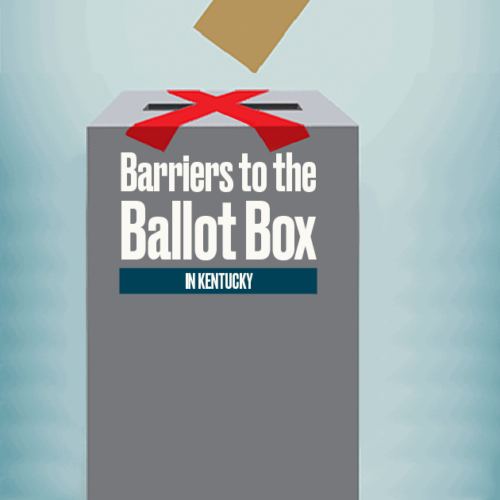Introduction
Fights over whether to make voting more accessible in the middle of a pandemic are raging across the country, but in Kentucky, officials set aside multiple barriers weeks ago.
Voting-rights advocates are relieved: If residents had been required to follow the state’s normal election rules this year, “we would have had major problems,” said Corey Shapiro, legal director at the American Civil Liberties Union of Kentucky. “Kentucky’s election laws are extremely unfriendly to voter access.”
Sign up for The Moment newsletter
Our CEO Susan Smith Richardson guides you through conversations and context on race and inequality.
Most of the moves are only temporary, however. Shapiro and other advocates want the changes to stay in place so it’s easier to vote.
Here’s a look at some of the most significant updates on restrictions to voting rights and access in the state:
Mail-in ballots and early voting
The state entered the COVID-19 emergency as one of the minority that required voters to have an excuse to cast an absentee ballot. Kentucky waived that rule for the primary election but was on track to go back to the old way for the general election.
The ACLU of Kentucky and other groups sued in May, saying the restrictions would force most residents to turn out to the polls and risk their health.
In August — while the case was still pending — Democratic Gov. Andy Beshear and Michael Adams, the Republican secretary of state, negotiated a deal to allow voters an absentee ballot if they’re afraid of COVID-19 impacts. The ACLU withdrew its challenge.
Dr. Jennifer A. Jackson, chair of voter services at the League of Women Voters of Kentucky, which was one of the plaintiffs, is glad that major sticking point got resolved.
“I think it’s a no-brainer,” she said. “The safest way to vote is from home.”
Voters will be given an opportunity to fix ballot problems, including missing signatures.
The deal the governor and secretary of state worked out also calls for ballot drop boxes and allows for early voting in person. That’s a first for a general election in Kentucky, which previously allowed early voting only for people permitted to cast an absentee ballot.
Early voting procedures in the primary varied by county, in some cases allowed by appointment only. For the general, counties must open at least one early voting location and offer Saturday hours.
Jackson hopes voters will make clear that they want these changes to stick. Otherwise, she believes, legislators aren’t going to act.
“They’ve already come out and said that’s not what they want to happen in the future, that this is clearly a one-time thing that they are doing because of the pandemic,” she said.
Photo ID
In March, shortly after the quickly spreading coronavirus was declared a pandemic, Kentucky’s legislature passed a law requiring a government-issued photo ID to vote, both in person and by mail. In April, legislators overrode Beshear’s veto of the bill. Such policies disproportionately impact lower-income residents, people of color and elderly voters.
Kentucky hasn’t had a documented instance of in-person voting fraud for decades. The law, Jackson said, made voting harder to stop a nonexistent problem.
The temporary rules the governor and secretary of state later agreed on allow people who don’t have a photo ID to vote in the general election this year.
Felony enfranchisement
In recent years, states that permanently stripped the right to vote from people convicted of a felony have changed course. That type of disenfranchisement has a long, ugly history: After the Civil War, white officials in the South targeted Black men for arrest and used these rules to block them from voting.
In December, Beshear signed an executive order that automatically reinstates voting rights to people with certain felony convictions after they complete their sentences, including parole or probation. Left out are people convicted of violent felonies, such as homicide and assault.
More than 170,000 people have regained their right to vote as a result of that policy change, Jackson said.
That change is not intended to be temporary. But executive orders can be undone by the next governor, as Kentucky residents already know. Beshear’s action was a reversal of his predecessor’s decision to sweep away a 2015 felony enfranchisement order written a month earlier by the previous governor — Steve Beshear, the current governor’s father.
Read more in Money and Democracy
US Polling Places
In West Virginia, one barrier to voting removed, other stumbling blocks still in place
The state will allow anyone to vote by mail this year. But officials could do more, advocates say.
US Polling Places
Voting is easier in Virginia now, unless you have a felony conviction
Reforms took away photo ID law and excuses for absentee voting.


Join the conversation
Show Comments